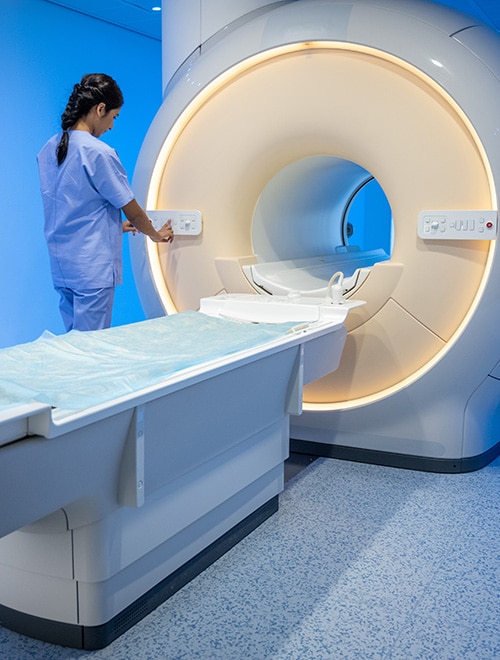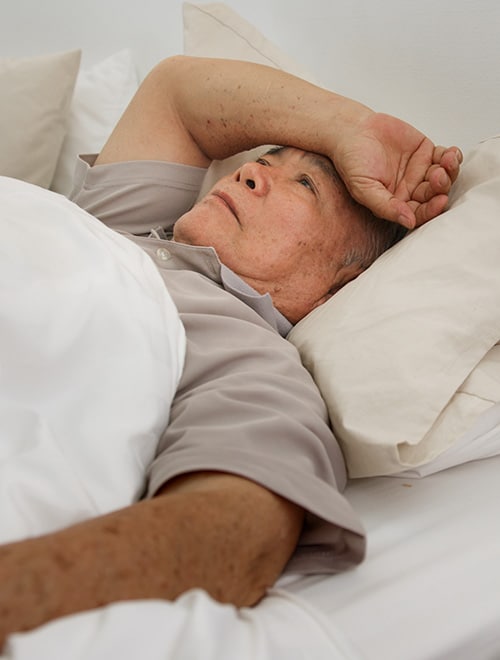- 9 min read
What is hormone therapy?
Testosterone is one of a group of hormones known as androgens which are important for the development and function of the male reproductive system. Normally, testosterone keeps your prostate healthy but in prostate cancer, it can help the disease to grow and spread.
Hormone therapy, also called androgen deprivation therapy (ADT), is the use of medicines to reduce the effects of testosterone and slow prostate cancer growth. It does this by either reducing testosterone levels or altering its actions on the cancer cells.
As a treatment option on its own, or as part of a combination treatment plan, hormone therapy is used to reduce symptoms and delay prostate cancer progression.
The aim of this section of your toolkit is to help you understand what hormone therapy is, who can have it, how it’s taken and how it works.
Who can have hormone therapy?
Hormone therapy may be recommended to you:
- If you have prostate cancer that has spread outside of your prostate gland or spread to other parts of your body (this is known as advanced or metastatic prostate cancer)
- If you have localised or locally advanced cancer and are not well enough or can’t have surgery or radiation therapy.
- To manage your symptoms if you are on watchful waiting.
- In combination with other treatments, such as chemotherapy or newer second generation (also called novel) anti-androgen medications.
- As an adjuvant therapy where it is given before, during and/or after prostate radiation therapy to treat localised or locally advanced cancer.
What’s involved in having hormone therapy?
There are many different types of hormone therapy medicines. Depending on the medication, hormone therapy can be given in oral tablets, injections, injectable implant, or a combination of these.
You may need regular appointments with your specialist doctor, GP or nurse every 1, 3, 4 or 6 months for your injection or implant. Hormone therapy may also be given to you in cycles, called intermittent hormone therapy.
You will have regular PSA tests to check if the treatment is working. Hormone therapy often causes a steady drop in PSA levels usually over several weeks.
How well hormone therapy controls your cancer is different for everyone, but you could be on this therapy for a few months, several years or indefinitely.
What is intermittent hormone therapy?
Intermittent hormone therapy means your treatment is stopped and restarted when needed, instead of being given constantly. When it is stopped and restarted depends on your PSA levels.
Intermittent hormone therapy is not for everyone – talk to your healthcare team to find out more or call a PCFA nurse on 1800 22 00 99 for advice and information
You may have therapy continuously for a while until your PSA reaches a low level and then be taken off the medication for a period while your PSA is being monitored. If your PSA levels rise again, you will be put back on hormone therapy.
The aim of intermittent hormone therapy is to give you a better quality of life during treatment by having breaks in therapy, which can mean less side effects. It can take 3 to 9 months and sometimes longer for the side effects of hormone therapy to wear off. In some men, they may never wear off. Your specialist will let you know if they think intermittent hormone therapy is suitable for you.
How does hormone therapy work?
Hormone therapy can shrink or slow down the growth of your prostate cancer and reduce symptoms. It does this by blocking the production of testosterone and/or its effect on prostate cancer cells.
To better understand how hormone therapy works it’s helpful to know about testosterone and how it’s naturally controlled in the body.
What is testosterone?
- Testosterone is a sex hormone, or androgen, which is made in your body
- It controls the growth and development of your sexual organs, including your prostate
- Testosterone is important for libido (sex drive) and certain features, such as facial and body hair, increased muscle and increased bone mass
- Most of your testosterone (90 to 95%) is made by your testicles
- The remainder of your testosterone comes from your adrenal glands, which sit above your kidneys
- If you have prostate cancer, testosterone can increase the growth of your cancer cells
- Small amounts of testosterone are also found in female bodies. It is made in the ovaries and adrenals and is important for female sexual development and health
How is the production of testosterone controlled naturally in your body?
Before we look at how each of the hormone therapy medications work on testosterone, let’s first look at how two hormones made in the brain naturally control the production of your testosterone. These hormones are luteinising hormone-releasing hormone (LHRH) and luteinising hormone (LH). Knowing this can help you understand how hormone therapy works as some of the medications affect the levels and actions of these hormones.
Let’s start in your brain. LHRH, also called gonadotrophin-releasing hormone, is produced by the hypothalamus in your brain. This hormone controls the release of LH from your pituitary gland. LH then acts on the testicles to control testosterone production.
The following steps may make it easier to understand:
- Your brain produces LHRH
- LHRH tells the pituitary gland to release LH
- The released LH tells your testicles to make testosterone
If you have enough testosterone in your body, LHRH is not produced, therefore LH is not released, and your testicles don’t make testosterone.
The areas of the brain involved in testosterone production (hypothalamus and pituitary gland), and how LH directly affects the testicles and their production of testosterone.
What are the different types of hormone therapy
There are many different hormone therapies, depending on your type of prostate cancer. If one type is not effective for you, your doctor may prescribe a different hormone therapy medication.
The types of hormone therapy include:
Injections and implants (usually given as a pellet injected under the skin) – these work in two different ways and are called:
- LHRH agonists
- LHRH antagonists
Tablets – the different types of tablets are called:
- First generation anti-androgens
- Second generation (newer or novel) medications – also called androgen receptor signalling inhibitors (ARSI)
Let’s look at each of these different types of hormone therapy medications.
Injections and implants
Hormone therapy injections and implants stop your testicles from making testosterone by blocking LHRH and LH production. To understand this process, follow the link to How is the production of testosterone controlled naturally in your body?
These hormone therapies are called LHRH agonists and LHRH antagonists, and they work differently in your body.
- An LHRH agonist works by tricking the body into thinking you have enough LHRH, so you stop making it, causing the testicles to stop producing testosterone
- An LHRH antagonist works by blocking LH release from the pituitary and therefore reducing testosterone production in your testicles
How are injections and implants given?
LHRH agonists: There are two ways that LHRH agonists can be given:
- An injection in your belly, buttocks, thigh or arm
- A small implant placed under the skin in your belly – once it is in place, you may feel some discomfort at the site for a few days
LHRH agonists are given at different intervals, depending on the type and dose of the medication prescribed for you. For example, you may need injections or implants once a month or once every few months.
The injections or implants can be given by your specialist doctor, GP or nurse. Some companies provide a home injection service where a nurse will come to your house to give you the injection. Ask your doctor or contact a PCFA Nurse to find out what services are available for you.
‘Tumour flare’ with LHRH agonists
For the first 7 to 10 days after the first dose of an LHRH injection, the medication can make your body produce extra testosterone. This can cause your cancer to grow for a short period of time and is known as ‘tumour flare’. It is a normal event associated with these medications.
To prevent a tumour flare, you may be given a short course of anti-androgen tablets, such as Cosudex® (also called Bicalutamide).
Taking these tablets for a short period before and after your first injection or implant will prevent the cancer cells from absorbing testosterone and stop any potential tumour flare. A short time after starting these tablets, testosterone levels in the body will drop to the same level as men who have had their testicles surgically removed. Very low levels of testosterone mean the growth and spread of your prostate cancer is slowed dramatically.
LHRH antagonists: These are given by injection, usually once a month, by your specialist doctor, GP or nurse. There is no need for you to also take anti-androgen tablets as ‘tumour flare’ does not happen with this medication, like it does with LHRH agonists.
Injections and implants – what are examples of these hormone therapy medications?
Examples of LHRH agonist medications include:
- Eligard® (Leuprorelin acetate)
- Lucrin® (Leuprorelin acetate)
- Zoladex® (Goserelin acetate)
- Diphereline® (Triptorelin)
An example of an LHRH antagonist medications is:
- Firmagon® (Degarelix)
You can read about these medications on the eviQ website by entering their names in the search area.
Hormone therapy tablets
Hormone therapy in tablets include:
- First generation (older class of medications) anti-androgens
- Second generation (newer or novel) hormone therapies – also called androgen receptor signalling inhibitors (ARSI)
First generation anti-androgens
Anti-androgen medicines are a type of hormone therapy that work by blocking the action of testosterone on your prostate cancer cells.
They are given in tablet form that you take each day on their own or in combination with other treatments.
Several anti-androgen medications are available. The medications that are commonly the first ones you will be given when starting anti-androgen hormone therapy include:
- Cosudex® (Bicalutamide)
- Androcur® (Cyproterone acetate)
- Anandron® (Nilutamide)
Cosudex® is often given in combination with hormone therapy injections or implants when you first start hormone therapy. However, all three may be used at the same time as injections or implants.
You can read about these medications on the eviQ website by entering their names in the search area.
Second generation (novel) hormone therapy medications
The development of new or novel hormone therapy medicines is a rapidly evolving area of medical research. These new medications, given in tablet form, work to block the effects of testosterone on prostate cancer, but have different ways they work in the body to first generation tablets.
Second generation hormone therapy may be used in one or more of the following situations:
- If you have advanced cancer (sometimes called metastatic hormone sensitive prostate cancer or mHSPC)
- When first generation drugs are ineffective
- In a condition called castration-resistant prostate cancer (CRPC) – CRPC is when your prostate cancer cells adapt and grow despite having low testosterone levels
Learn more about advanced cancer and CRPC by following the link to types of advanced prostate cancer to learn more about.
Examples of these novel medications include:
Novel androgen receptor signalling inhibitors – these work by blocking the effects of testosterone on prostate cancer cells. Examples include:
- Xtandi® (Enzalutamide)
- Erlyand® (Apalutamide)
- Nubeqa® (Darolutamide)
CYP-17 inhibitors – these work by blocking the production of testosterone in the testicles, adrenal glands and prostate cancer tissues. An example is:
- Zytiga® (Abiraterone acetate)
Talk to your doctor or oncologist to find out which of these medications may be appropriate for your circumstances. You can read about these medications on the eviQ website by entering their names in the search area.
Not all new hormone therapy medicines are subsidised by the Pharmaceutical Benefits Scheme (PBS). These may be subsidised for different stages of prostate cancer including hormone sensitive and castrate resistant prostate cancer. They are generally only available PBS subsidised once in a persons lifetime. Remember to ask your oncologist about the cost of medications being prescribed for you.
Considerations for deciding whether to go on hormone therapy
- Hormone therapy can provide a rapid and often long-term reduction in the growth of your prostate cancer. This is seen with a reduction in your PSA levels
- You need to also consider that this therapy can only slow the growth of your cancer and may help keep your cancer and any symptoms under control for years
- Hormone therapy may mean ongoing visits every 1,3,4 or 6 months to receive your injection or implant. Some other types of hormone therapy are given as a tablet
- Hormone therapy is reversible. In most cases, once treatment is stopped, your testosterone level and its effects on your body will return to normal after some time
- It has a range of side effects, which may improve over time, or once you stop the medication, but in some men, may never wear off
- Your doctor will prescribe the most appropriate medication for you, but if one type does not work for you, they may recommend a different one
If you decide to go on hormone therapy, you will have regular discussions with your specialist and healthcare team to make sure you are on the best treatment for you. This may include talking about:
- How you are managing on the treatment
- What symptoms or side affects you may be experiencing
- How best to manage any symptoms or side effects
What are the possible side effects of hormone therapy?
All prostate cancer treatments, including hormone therapy, come with potential side effects. The likelihood of having side effects depends on the type of hormone therapy you are taking and the length of time that you are on it. If you are having other treatments as well, you may also experience side effects from that treatment.
You can learn more about how these side effects and how they may affect you by following the link to side effects of treatment.
Looking after yourself and keeping track of your medical information during hormone therapy
Having prostate cancer can cause a wide range of feelings, emotions and you may even experience some physical effects. Hormone therapy also has possible side effects, so it is a beneficial to look after yourself during treatment.
You can read about ways to look after yourself in the Heath & Wellbeing section of this toolkit. If you need more support talk to your doctor or a PCFA nurse, who can connect you with support groups, other health professionals and resources for you and your family and friends.
It’s also vital that you don’t miss or delay your treatments. Book your hormone therapy injections or implants or other testing and general appointments in advance. You can keep track of your hormone therapy medication, dose, length of treatment, PSA tests and side effects in one convenient place in the downloadable document called the My Wellbeing Plan.
If you are feeling distressed call a PCFA Nurse on 1800 22 00 99 or if you need urgent help, call Lifeline on 13 11 44 or Beyond Blue on 1300 22 46 36
Key points
- Hormone therapy is also called androgen deprivation therapy or ADT
- This is a treatment for prostate cancer that reduces testosterone production and/or its actions in your body to slow prostate cancer growth. Testosterone can help prostate cancer grow and spread
- It may be recommended alone or with other treatments, depending on your type of cancer
- You may stay on hormone therapy for long periods of time, according to your PSA levels and disease progression
- Homone therapy is given as injection, injectable implant or tablet, continuously or intermittently
- There are different types of hormone therapy medications that work on reducing testosterone production and effects
- Hormone therapy may bring PSA levels down rapidly and over a long time, but does have many potential side effects






